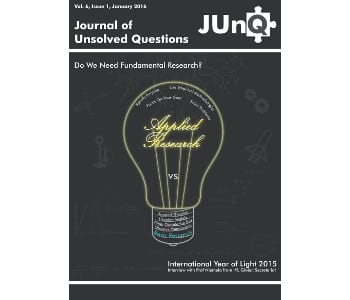 Our society is increasingly dominated by technology. And in many cases the corresponding improvements are the result of fundamental research. More precisely, they are not the outcome of an investigation that aimed to find a solution for exactly one technological problem in the first place. Referring to the relevance of fundamental research, Andreas Müller from the Technische Universität München and part of the Excellence Cluster Universe asks “Do we need fundamental research?” in the newest issue of the Journal of Unsolved Questions (JUnQ).
Our society is increasingly dominated by technology. And in many cases the corresponding improvements are the result of fundamental research. More precisely, they are not the outcome of an investigation that aimed to find a solution for exactly one technological problem in the first place. Referring to the relevance of fundamental research, Andreas Müller from the Technische Universität München and part of the Excellence Cluster Universe asks “Do we need fundamental research?” in the newest issue of the Journal of Unsolved Questions (JUnQ).
The term “fundamental research” is usually used for scientific investigations that do not have a specific application as purpose. In his essay, Andreas Müller states that we can only solve the problems of modern society, for example climate change, by means of fundamental research. In a short historic treatise, he elucidates the importance of fundamental research in the past – for example our knowledge about particle physics and radioactivity. In this context, it is also suitable to compare our curiosity with the will to enlarge our understanding of nature to cultural assets like literature and music. As further examples he mentions discoveries like lasers and penicillin – nowadays it is hard to imagine life without them.
His conclusion is that basic research is by no means a luxury but an indispensable part of a modern society. This also implies the financial aspect. In other words: industrial countries need to spend a significant amount of their gross domestic product on research and development, and on basic research in particular. Even if it takes a long time – decades or even centuries – to recognize: the impact of fundamental investigations, in some cases the return is sufficiently attractive that it is worth the wait.
Text kindly provided by Nicola Reusch, Philips-University, Marburg, Germany (Editorial Board Journal of Unsolved Questions, JUnQ).

















